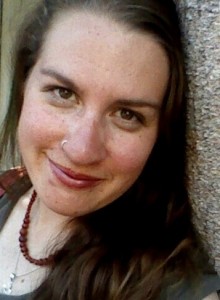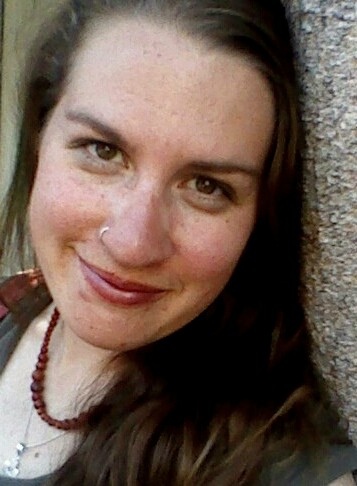Power, Privilege and the Coming Christ: Finding a Place in La Posada – Abby Mohaupt
 For the second year in a row, I’ll celebrate Christmas twice. Once with my congregation in suburban Palo Alto, and once with the rural community of Pescadero.
For the second year in a row, I’ll celebrate Christmas twice. Once with my congregation in suburban Palo Alto, and once with the rural community of Pescadero.
I am an interloper in these celebrations, preparing for the coming Christ with communities that often feel like they could not be more different.
The faith community in Palo Alto is a progressive, Presbyterian church that mostly loves the organ played by our gifted director of music. The Christmas Eve service is traditionally one of hymns and Scriptures, with the liturgy carefully timed so that the squirming congregation can relax together in the Fellowship Hall—which is, of course, a different kind of worship in itself. The congregation is mostly Anglo, and mostly middle/upper class, and mostly well-educated. It is a congregation with CEOs and Executive Directors, lawyers and teachers… a group of people who pride themselves (rightly so) on how wide they throw their doors open, seeking to imitate the broad welcome of God for all people. I love them for their welcome and I love them for the depth of their intellectual faith.
The community in Pescadero is rural and I’m not sure that there is an organ anywhere in the town. The community is filled with artists and farmers, people who are documented and not, people who have written books and people who cannot read. When they gather to celebrate La Posada (or “Mexican Christmas” as we gringos trippingly translate it), they are a group of Catholics and Protestants and people who do not claim any faith at all. A couple of the farm workers bring their guitars and they move from place to place in the procession, taking their time, but also itching to get to the final stop.
These are broad generalizations. Each of these communities is more complex than what a few words can convey. Palo Alto is in the center of Silicon Valley, butted up to Stanford and world-class medical care. Pescadero and the rest of the South Coast is an often-forgotten part of the South Coast, without medical care or a library or a place to buy a pencil.
Palo Alto is one of the richest communities in the world, oozing with power and privilege.
And yet.
For the second year in a row, these communities will observe La Posada together. The Palo Alto church has been in partnership with the non-profit in Pescadero, Puente, that hosts the Posada for several years, and last year was the first time that a large group from the church came to celebrate in Pescadero. As the pastoral resident at the church and the faith community liaison/volunteer coordinator at the non-profit, I hoped to strengthen the bridge between these communities. I am the only clergy person on staff at Puente, an interesting identity to hold at a secular non-profit while they plan a non-religious version of a sacred time.
In a posada, a community reenacts the journey of Mary and Joseph to find a room to stay in Bethlehem. It is a midrash on Luke 2:4-7:
Since Joseph belonged to David’s house and family line, he went up from the city of Nazareth in Galilee to David’s city, called Bethlehem, in Judea. He went to be enrolled together with Mary, who was promised to him in marriage and who was pregnant. While they were there, the time came for Mary to have her baby. She gave birth to her firstborn child, a son, wrapped him snugly, and laid him in a manger, because there was no place for them in the guestroom. (Common English Bible)
In Pescadero, the community will meet at the Catholic Church to be sent on their journey to find somewhere that will welcome them. We will stop first at someone’s home and we will be turned away. And we will be turned away from the second home, sent back into the night. Then we will be sent to the Community Church, where the doors will be open to us, and we will be welcomed in.
Last year, it poured rain.
As we started the procession, the rain eased up, but only to tease us into letting our guards down. We were soaked by the time we got to the first house and shivering by the second house (which we couldn’t see through the sheets of rain).
I struggled to identify the faces of people in my congregation in the dark and through the rain, and I could barely hear their voices over the wind. And when we got to the Community Church, the doors were still locked and one of the farmworkers had to run to the back door and unlock the door from the inside.
As we peeled off our layers of soaking clothing, I looked at my Palo Altans and prayed that they would have the grace to put up with the weather and that they would look beyond the privilege of their warm lives and relax into the experience. And they looked back at me with grins and bright eyes as they tried to dry off.
From the Community Church we walked to the community hall where my Palo Altans helped serve food and pass out presents, in between meeting Pescaderans and eating tamales.
And it eventually stopped raining, just in time for everyone to go home.
The following Sunday I was sitting with some of my church people who had gone with me to La Posada, and I was remembering just how terrible the rain had been. And one of my older members looked at me and said, “But the rain—that was the best part. That was the point.”
She reminded me that Mary and Joseph were looking for refuge—just as the farm workers who come looking for work near Pescadero do—and that they were turned away. She reminded me that in Palo Alto, it is so easy to assume that we will be welcomed and that we will not be turned away.
The rain was a great equalizer. The rain made the desire to be welcomed rise up in us—all of us—regardless of our education, our economic status, our immigration status, our language.
The longing to be welcomed—that longing echoes the longing of the people of Israel as they wait for the coming Christ, hoping that they will be welcomed by the love of God, regardless of their power, regardless of their privilege.
When the doors of the Community Church were flung open by the out-of-breath farm worker, the procession surged inside, with gratitude for the welcome and the escape from the cold, wet night. The light from the church flooded into the night giving a welcome that looked past the differences of the soggy crowd and only offered shelter.
And so it is with the coming Christ—flinging wide God’s welcome so that all of us, no matter where we come from or how much money we make or what language we speak, all of us are welcomed.
Abby Mohaupt is the Pastoral Resident at First Presbyterian Church in Palo Alto, CA. She came to First in May 2012 from Chicago, IL. During her Midwest days, she volunteered with a domestic violence shelter, worshiped with a bilingual/multicultural congregation, and tried to learn how to dance.
Abby earned a Bachelor of Arts in Religion and Sociology from Illinois Wesleyan University in Bloomington, IL, and she did her seminary training at McCormick Theological Seminary, in Chicago, where she earned a Master of Divinity and a Master of Theology. Her research interests lie in the intersection of environmental theology, pastoral care, and ecofeminism, particularly how those fields of study call us to create a world in which all people and all creation know that they are loved and valuable. Her liturgical interests lie in how to make radically inclusive communities of worship that invite all parts of our human selves (from our five senses to art and language) to engage.
When she’s not in the office, Abby works with Puente de la Costa Sur as the Faith Community Outreach Worker to deepen the relationship between faith communities and the communities around Pescadero. And when she’s not working at all, she enjoys a good run, delicious coffee, and creating multimedia art. Abby and her partner, Nathan, have three feline children, Mama, Panda, and Eve.

